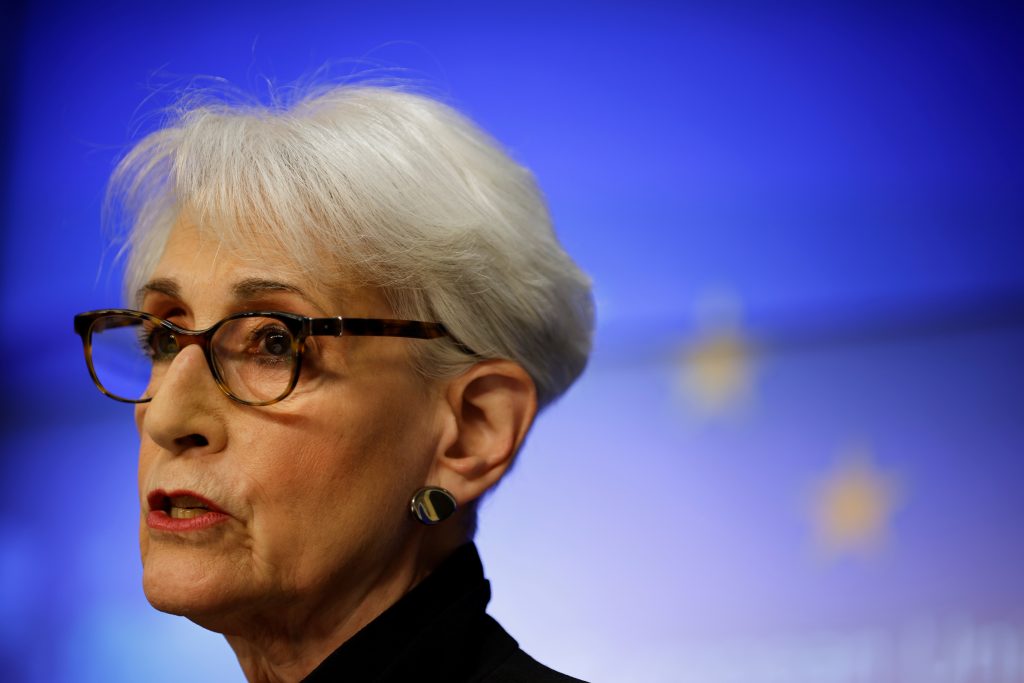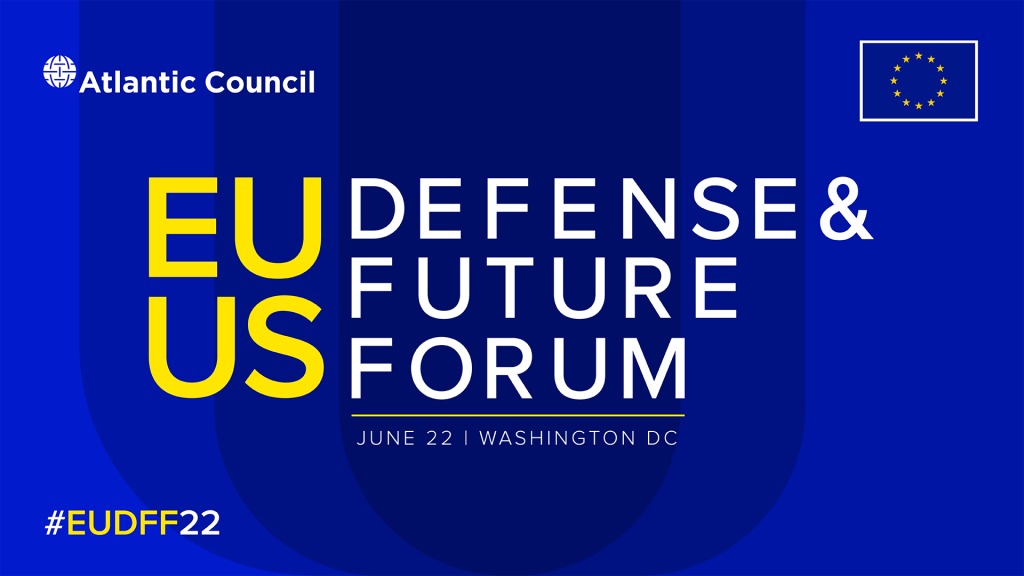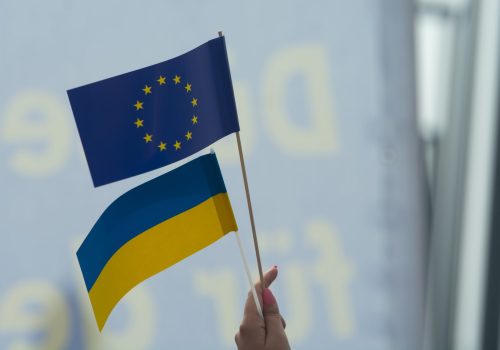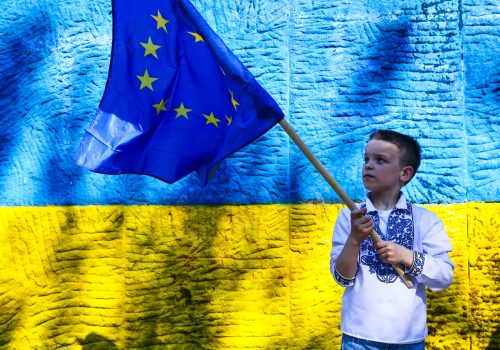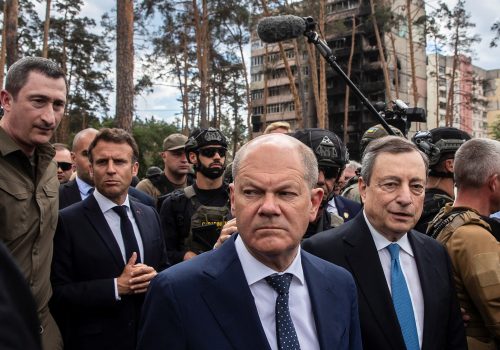Watch the EU-US Defense & Future Forum
Event transcript
Uncorrected transcript: Check against delivery
Speakers
The Hon. Wendy Sherman
Deputy US Secretary of State
H.E. Stefano Sannino
Secretary-General, European External Action Service
Moderator
Nick Schifrin
Foreign Affairs and Defense Correspondent, PBS NewsHour
NICK SCHIFRIN: Welcome to the keynote session kicking off the 2022 EU-US Defense and Future Forum. My name is Nick Schifrin. I’m the foreign affairs and defense correspondent for PBS NewsHour here in Washington.
This year’s event combines two of the EU Delegation’s flagship events dedicated to furthering the transatlantic relationship, the US-EU Future Forum and the EU Defense Washington Forum. And we’re here to discuss the role of the US-EU relationship in addressing the world’s challenges. And of course, right now nothing is more important than the war in Ukraine and Russia’s ongoing invasion in Ukraine.
And there’s no one better to discuss that with than Deputy Secretary of State Wendy Sherman and Stefano Sannino, the secretary-general of the European External Action Service of the European Union. Thank you very much, both of you, for being here.
Let me just start you out with two broad questions and then we’ll get into some of the many specifics that we should talk about over the next thirty minutes. Deputy Secretary Sherman, is US support to Ukraine—its people, its military—unlimited in time and scope?
WENDY SHERMAN: First of all, great to be with you, Nick. NewsHour just does great work for all of us. Really appreciate it.
And always a complete pleasure to be with Stefano Sannino, my partner in the US-EU relationship. My first trip as deputy secretary was to Brussels to kick off the US-EU-China dialogue and then a set of Indo-Pacific consultations.
Stefano and I talk virtually every week and are really as one in dealing with Russia and Putin’s unprovoked, unjust, and premeditated invasion of Ukraine. We did an enormous amount of diplomacy in advance trying to give Putin an offramp so he would not have to make this absurd and tragic decision. The United States and Europe are one in our commitment to Ukraine: Nothing about Ukraine without Ukraine. We’re not going to make decisions for Ukraine’s future.
We’re going to support Ukraine in its defense of its territory, of its sovereignty. No country should be able to unilaterally invade another country and decide what its future will be. And this is a solemn commitment, I think, in our partnership with Europe to make sure that Ukraine has what it needs to defend itself.
NICK SCHIFRIN: And a broad question to you, Secretary-General Sannino: Can Europe remain united in terms of weapons sent to Ukraine, in terms of energy, and in terms of what the end state is in Ukraine after this war?
STEFANO SANNINO: Well, first of all, also a very warm thanks for this opportunity and the possibility of having this dialogue with Wendy that has become, as she said, partnering in our—my professional life. It’s an area and a very good path there.
Look, I think, yes, [the] unity of European Union has been very strong since the beginning of this crisis. To be honest with you, I mean, I’ve rarely seen the kind of unity that I’ve experienced during the European Council a couple of days after the start of the invasion by Russia. And this sentiment is still very much there. This has allowed us to agree on six packages of sanctions, and I want to stress that it is true it was done really in very strong agreement and cooperation with the United States. And this is still there.
Now, it is clear that the more we move into this area—and, I mean, the more we are touching areas which are also very sensitive for member states—so the work that is needed is more intense. But the sense of unity, the sense of purpose, the determination to stay united is very strong, and I’m sure that the European Council at the end of the week will be an important watershed also for Ukraine in terms of perspective of becoming part of the European family. And we hope that we will be able to go beyond this formula and to be more specific in the coming days.
NICK SCHIFRIN: So over the next twenty-five minutes we’ll go over all those issues—certainly, Ukraine’s future inside of Europe. We’ll talk about weapons. We’ll talk about energy. We’ll talk about Russia’s behavior and whether it can be changed. And I do want to end on China.
But let’s talk about—let’s start with Ukraine’s future, and let me start with Deputy Secretary Sherman. President Zelenskyy a couple days ago put it this way, that Kyiv’s goal is to, quote, “free our entire territory, drive the occupiers out of all of our regions.” That seems to include Crimea and the parts of the Donbas that Russia has controlled, or occupied or controlled, through its proxies since 2014. Is that the US policy as well? And does the US have a plan to support Ukraine with enough weapons to actually dislodge Russia from all of that territory?
WENDY SHERMAN: Well, Nick, as I said to you, it’s nothing about Ukraine without Ukraine. It’s not our judgment that matters here; it’s Ukraine’s judgment about what it wants for itself and for its own future.
You know, this was the basic premise at the beginning of all of this. Putin said that NATO posed a threat to Russia. NATO is a defensive organization. It poses no threat whatsoever to Russia. Somehow, Putin believed that Ukraine was a threat to Russia, which is sort of absurd when you consider that Russia is a permanent member of the Security Council, has—with the United States—the largest stockpile of nuclear weapons, was an economy of some size, and certainly a geographic territory that was enormous; had natural resources, had energy. And to think that Ukraine was the threat to Russia was completely absurd.
So we have to go back to the beginning of this and understand that Putin really, in his own words, has really said he wants to be Peter the Great of the twenty-first and twenty-second centuries. So what Ukraine wants for its future is to decide its own future, which is what every country wants for itself. And we and the European Union—and quite frankly, over forty countries around the world—have supported sanctions and actions and called for the end of Putin’s unprovoked, unjust, and really horrific war.
NICK SCHIFRIN: Let me just press you a little bit, Deputy Secretary Sherman, on this a little bit, just to make sure we all understand. So President Zelenskyy is talking about a military objective to not only reseize territory occupied by Russia since February 24, which in itself is going to be difficult, but also take back territory that Russia has controlled since 2014. Ukraine is asking for specific weapons from the US in order to do that. The US has tried to calibrate which weapons it does and doesn’t send to Ukraine. Is the US committed to Zelenskyy’s military objective that he’s elicited?
WENDY SHERMAN: So our goal is really straightforward: We want to see a democratic, independent, sovereign, and prosperous Ukraine with the means to deter and to defend itself against further aggression. That’s our goal, our objective.
We have, with this week’s announcement—actually, it was last week—one billion dollars in additional security assistance. Our total security assistance to Ukraine totals about—and I’ve got to look at a piece of paper for this—
NICK SCHIFRIN: 5.4 [billion dollars], yeah.
WENDY SHERMAN:—5.6 [billion dollars], Nick—since February 24.
NICK SCHIFRIN: Shortchanged it.
WENDY SHERMAN: Approximately 6.3 billion [dollars] since the beginning of the administration. More than 8.3 billion [dollars] since Russia’s initial invasion of Ukraine in 2014. So we are continuing to provide security assistance. And that very critical HIMARS MLRS system is now in Ukraine and will give Ukraine the ability to defend itself in more substantial and robust ways.
So, look, this is a long future that we’re looking at. This is very challenging. We will work with Ukraine, we will work with Europe, we will work with allies around the world to support Ukraine to defend itself and to define its own future.
NICK SCHIFRIN: Secretary-General Sannino, let me bring you in and just ask that broad question at first. Zelenskyy, quote, “free our entire territory, drive the occupiers out of all of our regions.” Do you agree?
STEFANO SANNINO: I think that, I mean, I cannot but echo what Wendy has just said. I mean, this is for Ukrainians to decide what they want to do and this is really a very strong sense that we have that this is not our choice. We are supporting Ukraine in the objectives that they want to achieve, and for us, it will remain so until the very end. So, I mean, and if you see also the conclusions of our European Council, we are not even making any reference to any kind of peace settlement because we want to make it clear that we are not pushing in any possible way Ukraine to take decisions that they think that they are not ready for.
So for us, what is important is to keep, let’s say, the level of support that we have given Ukraine up until now militarily, financially, politically. And, as I say, the decision on having Ukraine joining in the future the European Union is something that is very strong. And I think that politically it’s one of the most important things that we could do.
Wendy was rightly mentioning the idea of Putin that Ukraine had to be reigned and brought back to the Russian whatever—empire, or space, or sphere of influence. And now this is exactly what is happening, Ukraine is becoming—or, will become, in the future, after negotiations, after a process—will become a member of the European Union. But the signal it is coming, we hope before the end of this week, is a very strong signal to the people of Ukraine. Also in this specific moment, when they need to be reassured about the fact that they will be where they choose to be.
NICK SCHIFRIN: And I want to ask you about that announcement this week in one second. But I want to drill down one more time on what is the future of Ukraine, and whether Europe is united. Of course, we saw a united front with much of Western Europe leaders visiting Kyiv recently. But I want to bring you back a couple weeks. President Duda visited Kyiv—President Duda of Poland visited Kyiv and spoke to the Rada. And he said, quote, “If Ukraine is sacrificed for holy calmness, economic reasons, or political ambitions even a centimeter of its territory, it will be a huge blow for the Ukrainian nation and the entire Western world.” He was, obviously, voicing some fears both in Ukraine and across much of Eastern Europe that Western Europe does want to pressure Ukraine. Just making sure, you believe today that Eastern European leaders and Western European leaders are united on no territorial—no territorial giveaways, I guess, for lack of a better word, by Ukraine, unless Ukraine were to decide for itself?
STEFANO SANNINO: I told you, and I repeat once again, the decision of what Ukraine wants to do will stay with Ukraine, and European Union will continue supporting Ukraine in their choices and in the way they want to move ahead. And I think that we are showing in concrete terms, again, with all forms of assistance. We just agreed on a huge package of nine billion [in] macro-financial assistance for Ukraine, and there is no expectation in the European Union about this.
So I think that the sense of direction is very clear. The sense of purpose is very clear. And I don’t—honestly, I do not see divisions between east and west and between north and south.
NICK SCHIFRIN: And let’s stay with you and talk about this week. I believe you used the word “hopefully” Ukraine will be invited to become a candidate for the European Union this week. Do you believe, can you tell us, whether Ukraine will be invited on Thursday during the first of two days of meetings? And are you worried about what Kyiv has discussed in the last few days, which is some kind of Russian provocation in the days leading up to that announcement?
STEFANO SANNINO: Well, I’m saying “hopefully” because, I mean, the decision stays within the hands of the heads of state and government, and I cannot judge what will be the decision that will be taken on Thursday. I think that, given the preparatory work that we have been doing in these last few days after the Commission has presented its opinion, its proposals about the future of Ukraine, I feel comfortable and I feel optimistic saying that the decision will be a positive one. But again, I mean, I have to respect the decision of our political bosses in the coming hours.
NICK SCHIFRIN: And I asked briefly about Russian behavior. Let me go back to Deputy Secretary Sherman and ask about that. So is the US concerned about Russia launching any kind of provocation, as presumably we await this announcement on Thursday that Ukraine will become a candidate for the European Union? And a larger question, Wendy Sherman, is the US still concerned that Russia could escalate using nonconventional weapons?
WENDY SHERMAN: Thanks for the question, Nick. Look, this is very serious. We look at every possibility, everything that Putin might do, including contingencies that would be outside the norm of any kind of conventional warfare. We have ongoing discussions with our European colleagues about potential contingencies. So we are ready. But quite frankly, I hope that President Putin understands that we have thought these things through, that we would have an appropriate and forceful response, that in fact escalation is not in his interest.
He is already facing a contraction of his economy by 10 to 15 percent. His people are suffering in this situation. It’s not just the Ukrainian people—who, of course, are suffering the most because of the bombs and the missiles and the ongoing warfare in their country and the destruction of so much of their infrastructure. But the Russian people are suffering as well. Putin is being sidelined around the world as someone not to do business with. Countries are looking to hedge, who have relied on Russia for their military weapons, understanding that Russia won’t have them to give anymore. They won’t be able to get replacement parts.
Russia has stopped the passage of grain to the rest of the world. It isn’t our sanctions or European sanctions that are stopping food security around the world. It’s Putin’s actions that have blockaded grain from leaving the port and getting to people around the world. The same with fertilizer. The same with sunflower oil. These are all Putin’s choices. So I think that, yes, we look at every possibility. We are ready. But we think that President Putin should think more than twice about any such contingencies, any such escalation. Because the world is watching and ready to react in ways that will not get him what he wants. Will get him absolutely opposite of what he wants.
That’s happened here. He wanted a weakened NATO. He has a stronger NATO. He wanted a weakened European Union. He has a stronger European Union. He wanted a weakened transatlantic relationship. He has a stronger transatlantic relationship, and our relationships around the world have gotten stronger as well. As I said, more than forty nations have joined together in like-minded response. So we’re ready. I hope he makes the wise decision.
NICK SCHIFRIN: Just a quick follow-up on that. Is there any reduction of fear that Putin could escalate, because Russia is making—small, but nonetheless—incremental gains in the east?
WENDY SHERMAN: Well, I think these are judgments. I can’t figure out what President Putin will do next. Yes, they’re making incremental gains, but so is Ukraine. We are in the grind-it-out part of this invasion. And I think we’ll see what happens in the days ahead as Ukraine gets more sophisticated weapons and increases its capabilities.
NICK SCHIFRIN: Secretary-General Sannino, let’s go back to Russian behavior and what Deputy Secretary Sherman was talking about a little bit in terms of the specifics on the impact on the Russian people and the Russian government. Mentioning specifically things like parts, that Russia will certainly struggle to import and maintain. But that’s over the next five years, ten years. More short term, Ukraine, of course, is asking the Europeans to punish Russia through no buying Russian oil and, of course, Russian gas, as we call it in the States natural gas. So can you let us know whether you think efforts to get countries like Germany away from Russian natural gas are increasing and whether that can be twinned with some of the announcements that we’ve heard from Germany and others of actually, you know, restarting coal plants as Europe continues to try and go carbon neutral?
STEFANO SANNINO: Well, different sets of questions.
So, first of all, there is a decision that has been taken by the heads of state and government of the European Union to decouple and to stop any kind of import of carbon—of oil, of gas and coal from Russia. This is not something that can be done overnight. Otherwise, I mean, the risk of a collapse of the economies will be there. So we are trying to do it in an ordered fashion. And a number of decisions have already been taken in that perspective, including on oil. The decision is taken and it will be implemented over time. And honestly, I don’t think I need to single out any specific country from that point of view because it’s the—a decision has been taken by all the member states of the European Union, taking into account also the specificity and the dependencies of some of our countries from the Russian gas or the Russian oil.
The second point is that, clearly, in order to do so, in order to reduce dependencies, we need to find alternatives. And we need to do it responsibly, once again, to underpin the development of our economies. And it’s what we are trying to do, trying to find alternative sources. The United States is one of these alternative sources, as are some of the countries of the Gulf. And we are trying to use, essentially, hydrocarbons, which are—sorry, not hydrocarbons—the oils and gas, which is, let’s say, compatible with what we already have, right, in terms of pipeline in order to avoid to build new pipelines and new structures.
What is important now is to continue our work in terms of bringing a change of our economies and so the so-called green transition, moving to renewables, which is moving even faster. We have a program of, let’s say, reducing significantly the dependence on oil and gas in general and moving towards the renewables, and this is not going to change. But in the meantime, we have to have a transition that, as I said, could allow our economies to stay and have the capacity to continue our, let’s say, industrial system, to have our industrial system to work.
NICK SCHIFRIN: Deputy Secretary Sherman, let me ask a broad question, after that answer. Do you believe that there’s any punishment that can be exerted on Russia to change Russia’s behavior in the short term? Or is this really just about Ukraine holding out and coming up with whatever version of victory it has?
WENDY SHERMAN: As I said, Nick, I have met President Putin. He is a smart man, on top of his brief. But I can’t get into his head and understand what might make him stop. He began this invasion. He can stop this invasion. I’ve been to many, many countries in this over a year that I’ve been deputy secretary of state. And everywhere I have gone, I have said: You know, please, please talk with President Putin. He began this. He can stop it at any point. It is not in his interest. He is not achieving his aims. There are many offramps he can take here. So far, he has not chosen to take any of those offramps.
As I said, before the first day of this invasion we were engaged in very intense diplomacy, NATO was. I was personally with Russian colleagues. To say, yes, we understand you have some legitimate security concerns. And here are many ways in which we can address them. But he was insistent that the only way was to go back to NATO of 1997, which is absurd. Countries get to make and decide their own political futures. Other countries don’t decide that for them. So this is about Vladimir Putin making a choice that’s good for the security of his country and the security of the world so far. He has not chosen to do that.
I’m sure there will be discussions in the G7 and in the NATO meetings and in the EU meetings this week to try to do whatever we can to encourage him to make the right choice here. But so far, he has looked at his own interests and not the interests of his people or the world.
NICK SCHIFRIN: It is, of course, indicative that I’ve spent the first twenty-five minutes talking about one subject, but of course, you guys have the whole world to look at. So just in the last five minutes, I suppose, we should talk about the larger subject of China. And, Secretary-General, I want to ask you a question about China, but also about regulation and technology. We’ve talked a lot about unity. Both of you have mentioned it. But there are different philosophies in the US and Europe regarding the regulation of technology. And I wonder if you believe that’s hampering at all the ability for the West to create a united front against Chinese technology which, of course, we’ve seen spread throughout the world and be used for authoritarian purposes.
STEFANO SANNINO: Well, I mean, honestly, the simple answer is no, in the sense that what we are trying to do and we are trying to do with the United States in the context of the so-called TTC—the Trade and Technology Council—we are trying exactly to do this, to look at the—and also in the context of the dialogue that we are having with Wendy on China. We are trying to look at the ways on how to make sure that our capacity, that our technology, that our I would call edge on the technology—technological edge could remain intact and not be touched and challenged by China.
We have to be aware that China is doing a lot of work. We cannot underestimate the importance of the achievements in China and we cannot underestimate the fact that it is a very strong competitor also from that point of view. But this is the reason why we need to look at how to keep this technological edge, but also how to make sure that the unfair practices that are coming from China cannot be used against us. And that’s the reason why we are looking together at anti-coercion measures, that we are looking at screening of investments, to make sure that the openness of our system does not become a vulnerability and that, essentially, we can continue to be a market economy, open-market economy, but without having the—running the risk of becoming vulnerable to unfair practices that are coming from third countries and from China in particular.
NICK SCHIFRIN: Deputy Secretary Sherman, I only have about two or three minutes left. And I know you won’t want to make any news before any presidential announcement, but obviously, in the news is whether the administration will lift any of the tariffs on China imposed by the Trump administration. So I’ll just ask the general question, well, will you, but I’ll give you your chance to answer a question that I know you’ll want to, which is: Do you believe that there are—there is a strategic way to employ tariffs, and is that what you’re looking at?
WENDY SHERMAN: I think that tariffs should be strategic, and that’s certainly what we’re looking at, and the president has said so over the weekend. And he’ll decide how he wants to proceed, but tariffs should always be strategic.
And I fully endorse everything that Stefano just said about what we are all trying to do and how together we are on doing it; to make sure that countries understand that technology can be used for good but it can also be used for surveillance systems, it can be used to undermine freedom, it can be used to gather data that gives unfair advantage. And so we want everybody to be eyes open on their investment screening, eyes open on their technology that they import into their countries, and make sure that people know that we need transparency in what we do in the world in this technological future because it’s going to be a very complicated one and very, very challenging.
NICK SCHIFRIN: Secretary-General Sannino, I’m told I have ninety seconds left so I’ll give you the last word on that. Obviously, the Trump administration was very concerned about European perspectives on Huawei and technology. Do you believe that today Europe and the US are working better on Chinese technology, but crucially that European countries themselves have identified the threat of Chinese technology that Deputy Secretary Sherman just identified?
STEFANO SANNINO: Absolutely yes. I mean, as I was saying, that’s the reason why we are working together in the context of the Trade and Technology Council. That’s the reason why we have developed instruments that are preserving the openness of our economies but, again, protecting at the same time the same openness in our markets. So I think that there is a completely different awareness.
We do not want to have an all-out confrontation with China. We think that there are also areas where we can cooperate. But we will not shy away when it will come the moment of confronting decisions or choices that are not in the interest of our countries and not in the interest of the openness of our economies.
NICK SCHIFRIN: Well, there’s a lot more to discuss, of course, but I am out of time. So thank you very much to the deputy secretary and the secretary-general for joining us for this opening keynote discussion for the US-EU Defense and Future Forum. The Forum is hosted by the Atlantic Council and the Delegation of the European Union to the United States. So please follow along virtually and in-person in Washington, DC, for a great full day’s program on the EU-US relationship and the transatlantic partnership going forward. Thank you very much.
Watch the event
Further reading
Tue, Jun 21, 2022
What would EU candidate status mean for Ukraine?
UkraineAlert By Peter Dickinson
Ukrainians expect the country to be granted official EU candidate nation status at this week's summit of European leaders but what would this mean for Ukraine's broader ambitions for greater Euro-Atlantic integration?
Sun, Jun 19, 2022
EU candidate status for Ukraine is the ideal response to Russian aggression
UkraineAlert By Diane Francis
European Union leaders must decide this week whether to grant Ukraine official EU candidate nation status. This is a critically important moment for Ukrainians that will also shape the future direction of the entire continent.
Thu, Jun 16, 2022
How NATO can stick together and keep the pressure on Russia, according to four former Alliance chiefs
New Atlanticist By Katherine Walla
Four former NATO chiefs gathered at the Atlantic Council to weigh in on the Alliance's response to the war in Ukraine, enlargement, and the next plays in its playbook.
Image: US Deputy Secretary of State Wendy Sherman attends a news conference in Brussels, Belgium on April 22, 2022. Photo via REUTERS/Johanna Geron.
